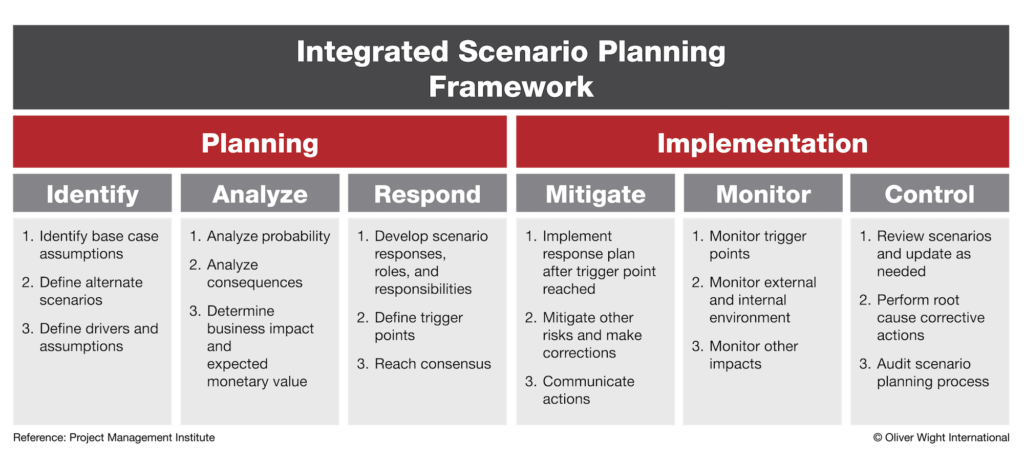By Pamelyn Lindsey, CSCP, Oliver Wight Business Advisor
With the impacts of the Coronavirus continuing to advance, how can we be prepared for events like these? While the response will be multifaceted, the most effective response is pre-planning. For those businesses, countries, and organizations that have thought through the possibilities of events such as this, the unwanted impacts can be minimized. One method of preparedness is Scenario Planning. This approach can be applied in any area of our life – at work, at home, and in our communities. In the case of business planning, and even more specifically, supply chain risk management, scenario planning has proven to be an effective tool to prepare for potential events.
As previously described in the White Paper, Scenario Planning – A Necessary Skill to Drive Better Decision Making in Integrated Business Planning, I discussed the Framework for Scenario Planning as seen below.

The skills to effectively apply scenario planning to potential events are needed more than ever as we increasingly experience events like the Coronavirus. While this event is rare, the basic principles and best practices, are just as relevant as for more common, less drastic events like increases in demand, loss of production, or supplier disruptions.
During times of acute consequences, organizations can focus on the following aspect of the Scenario Planning Framework in the Integrated Business Planning Process:
In the Planning Phase
- Identify and define alternate scenarios. This is the time to think outside the box when we ask the question “What-If?”. Expand your thoughts to rare events to ensure that the proper responses are developed.
- Analyze the consequence. We must know the real possibilities. How bad can it get? Remember, it is often very uncomfortable to think in this way.
- Define trigger points for action. Under what conditions will we take actions that might otherwise be seen a drastic?
In the Implementation Phase
- Implement responses. We are currently in this phase with the Coronavirus. Responses are often only as effective as our planning and preparation, but it is possible to develop just-in-time responses in real-time.
- Monitor other impacts. Businesses can proactively monitor and assess the impacts in unknown areas like suppliers’ suppliers located in affected areas, customers with unique needs for critical products, and long distribution channel impacts.
- Adjust the Scenario Planning Process. Now is the time for Agility and Responsiveness. Time is of the essence to minimize adverse impacts.
Scenario Planning Is a Necessary Skill
How well is scenario planning performed in your organization? My experience has shown it is a necessary skill to drive better decision making, cross-functional collaboration, improved financial results, and agile responses. Feel free to contact me to discuss how to build scenario planning skills in your organization.
Learn more about our Integrated Scenario Planning Workshop.


